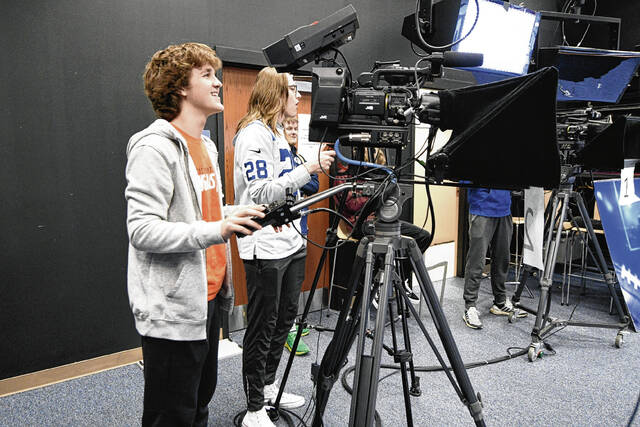If it’s a Franklin Community High School sporting event, he’s most likely the voice behind the action.
Thomas Crow dreams of one day doing play-by-play at a Super Bowl or NCAA Final Four. Those dreams were bolstered by Franklin High School’s broadcasting program, he said.
“Last year, football games were just open to parents. I still wanted to go to games, but I thought ‘why not just start a broadcasting system?’” Crow said. “I started doing play-by-play, which is what I’m going to college to do. I do play-by-play, a trivia show, our podcast and other spot things. Because of how many opportunities we have through the media program, I (broadcast) football, girls basketball — I would do boys basketball but I’m on the team — baseball, softball and track.”
He is heading to Indiana University in Bloomington this fall to continue on that trek, and he’s certainly got his footing.
Crow is one of many students at local schools who are turning their attention to broadcasting as a possible career, especially now in the age of live-streams and podcasts, and schools are taking notice. They’ve added or improved programs, and hired new teachers who specialize in those areas.
The senior shares a podcast discussing and ranking movies with Zack Johnson, also a Franklin High School senior. Johnson also helped produce Crow’s trivia show. He started a YouTube channel in seventh grade, but Johnson said the broadcasting and podcasting program at the high school helped him refine his craft.
“I started making YouTube videos. This has taught me terminology and professional aspects and I can communicate the skills I’ve learned over the years and how to make a cleaner, more consistent product,” Johnson said. “I run switcher for sports broadcast live-streams. I’ll add graphics and switch cameras, giving me experience I can take to college next year and broaden my horizons.”
Johnson hopes to work on film sets, directing and producing movies in the future, he said.
As is the case at Franklin, Whiteland Community High School’s broadcasting and podcasting program expanded during the coronavirus pandemic. Not as many people could attend high school sporting events, creating the need for live-streaming and play-by-play, said Lucas Corley, a radio, TV and marketing teacher who started at the high school during the 2020-21 school year.
Before the pandemic, student-run sports broadcasts at Whiteland were practically non-existent. But last year, students broadcast football games, and this year, students are broadcasting volleyball, soccer, basketball, wrestling, swimming, track, baseball and softball, too, he said.
“One of my biggest goals was to make performing arts and athletics the center of what we do,” Corley said. “We cover every sporting event we possibly can. We have podcasts, which are becoming bigger among younger people.”
During the fall semester, students in the radio and TV class had to put together at least three podcasts. For the spring semester, Corley nixed that requirement, instead opting to ensure students who truly wanted to take part in podcasting had the resources and time they needed to do so. One podcast in particular has become a mainstay. Titled “Glory Days,” it is now a semi-weekly venture and has 20 episodes. The podcast comes naturally as it covers miscellaneous topics, but consistency is key, said Jacob Smith, a senior, who is part of a team of four also including seniors Brady Wire and Tristan Yeagy, and sophomore Ava Smith.
“We have a podcast essentially every day because we talk, this just is putting a mic in front of our face,” Jacob Smith said.
Ava Smith will have to form a new group when her three co-hosts graduate, but she is up for the challenge, she said.
“I feel like I’m going to have to figure out what personalities are good on the podcast, not just my closest friends, but those willing and interested in doing this so we have stuff to talk about and show (some) personality on the podcast,” Ava Smith said. “I think it’s a good way to be creative and put out your thoughts. Normally, work is something people dread, but this is a good way to enjoy work.”
Greenwood Community High School also turned its attention to its broadcasting program and created a control room. The control room, which is already in use, is a centralized location students can refer to during games, said Lindsey Glaze, club director for the Woodmen Broadcast Network.
“The command room will be in one place, they’ll have cameras on the court and commentators out there, but replay and the switcher/producer will be in a separate room near our gyms in close proximity. It will allow better training and communication,” she said. “It’s impressive to have students know so much of the behind-the-scenes and operational aspects of broadcasting. It’s been fun to watch and learn from.”
Stuart Luhigo, a sophomore at the high school, serves as the network’s tech director and spends eight to 10 hours preparing for each broadcast, he said.
“For me, it’s definitely given me experience in leadership roles. It’s all student-led,” Luhigo said. “Leadership wise, it’s helped me lead a team and come up with things without much guidance from people.”





